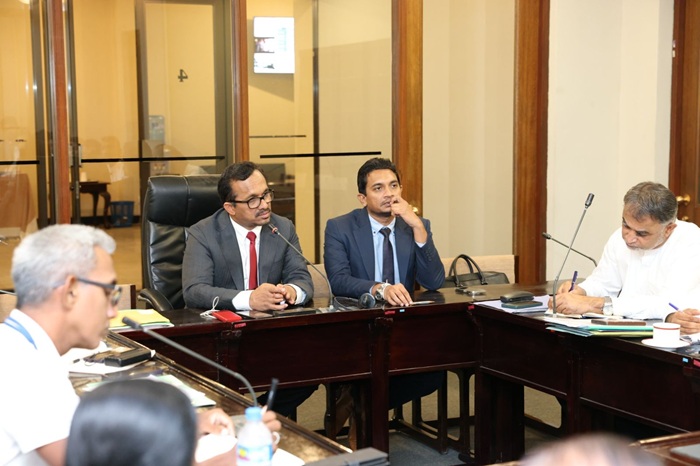
The Ministry of Industries and Entrepreneurship says it has established District Industrial Committees and advisory committees to address district-specific issues.
These committees include key district-level officials such as the District Secretary, the Governor, and the Chairperson of the District Coordinating Committee.
Additionally, at the Divisional Secretariat level, Divisional Industrial Committees are functioning under the leadership of the Chairperson of the Divisional Coordinating Committee.
A special discussion regarding the coordination of the Ministry of Industries’ operations and district-level activities was held in Parliament this week under the leadership of the subject Minister Sunil Handunneththi and Deputy Minister Chathuranga Abeysinghe.
This meeting was attended by Members of Parliament representing every district of Sri Lanka, along with the private staff of both the Minister and Deputy Minister.
The main objective of this meeting was to establish mechanisms to address district-specific issues under the mediation of 25 designated Members of Parliament.
Industrial Development Committees and Their Functioning
The Ministry has already initiated the establishment of District Industrial Committees, which include key district-level officials such as the District Secretary, the Governor, and the Chairperson of the District Coordinating Committee.
Additionally, at the Divisional Secretariat level, Divisional Industrial Committees are functioning under the leadership of the Chairperson of the Divisional Coordinating Committee.
These committees also include representatives from:
– Industrial Development Officers
– Provincial Industrial Authorities
– Industrial Development Board (IDB)
– National Enterprise Development Authority (NEDA)
– Small Enterprise Division (SED)
– Export Development Board (EDB)
– National Craft Council and similar institutions.
Moreover, infrastructure-related agencies such as Chambers of Commerce, Banks, the Urban Development Authority (UDA), the Ministry of Lands, and Energy Committees can also be invited to participate as relevant.
The primary goal of these committees is to resolve industry-related issues, such as land acquisition, raw material transportation, bank credit, and energy supply, at the regional level.
If these issues cannot be resolved regionally, they must be escalated to the District Committee, and if still unresolved, further referred to the Ministry.
Role of the Ministry and Advisory Committees
The main function of the Ministry of Industries is to facilitate and support industrial activities, not to engage in industrial production itself. The Ministry is responsible for resolving policy-related issues, including taxation, import/export challenges, and more.
There are about 24 Advisory Committees established for various sectors such as garments, food, boat manufacturing, spices, vehicle manufacturing, and consumer goods. These consist of representatives from leading institutions and chambers within each sector.
These committees discuss policy-related matters (e.g., VAT, import/export regulations) and submit recommendations to the Ministry, the Cabinet, the Ministry of Finance, or the Ministry of Trade, as appropriate.
The Role of Parliamentarians
It was emphasized that Members of Parliament should focus on resolving issues at the policy level, rather than engaging in day-to-day, village-level matters such as loans, property disputes, or business conflicts. Such grassroots issues should be addressed by the relevant local committees, and only unresolved policy-level matters should be brought before the Ministry.
Key Responsibilities of Parliamentarians at the District Level:
- Launching large-scale projects: Initiating major industrial ventures (e.g., a garment factory or industrial zone) that generate significant employment.
- Utilizing idle lands and buildings: Identifying underused or uncultivated lands and government buildings and proposing their industrial use to the Ministry.
- Reactivating dormant industrial estates: Identifying non-functional factories or lands in existing industrial estates and facilitating their reactivation or handover to new entrepreneurs (agreements may be arranged through the Ministry).
- Preparing study reports: Compiling data and reports on available lands and businesses for submission to the Ministry.
Parliamentarians Appointed for Ministry Coordination by District:
- Vasantha Piyathissa – Ampara District
- Upali Samarasinghe – Vavuniya District
- Oshani Umanga – Kalutara District
- Nandana Padma Kumara – Kalutara District
- Ajantha Gammaddage – Matara District
- T.K. Jayasundara – Galle District
- Rajeevan Jeyachandramurthy – Jaffna District
- Dr. Sellathambi Thilakanathan – Mullaitivu District
- Aruna Panagoda – Colombo District
- Kandasamy Prabhu – Batticaloa District
- Padmasiri Bandara – Polonnaruwa District
- Ravindra Bandara – Badulla District
- Vijesiri Basnayake – Kurunegala District
- Sunil Rajapaksha – Ratnapura District
- Deepthi Wasalage – Matale District
- Ruwan Wijeweera – Monaragala District
- Athula Welangoda – Hambantota District
- Champika Hettiarachchi – Gampaha District
- Mohamed Faizal – Puttalam District
- Thilina Samarakoon – Anuradhapura District
- Roshan Akmeemana – Trincomalee District
- Thanura Dissanayake – Kandy District
- Manjula Suraveera – Nuwara Eliya District
- R.M. Samantha Ranasinghe – Kegalle District
- M. Jegadeeswaran – Mannar District
- Elankumaran – Kilinochchi District. (Newswire)
